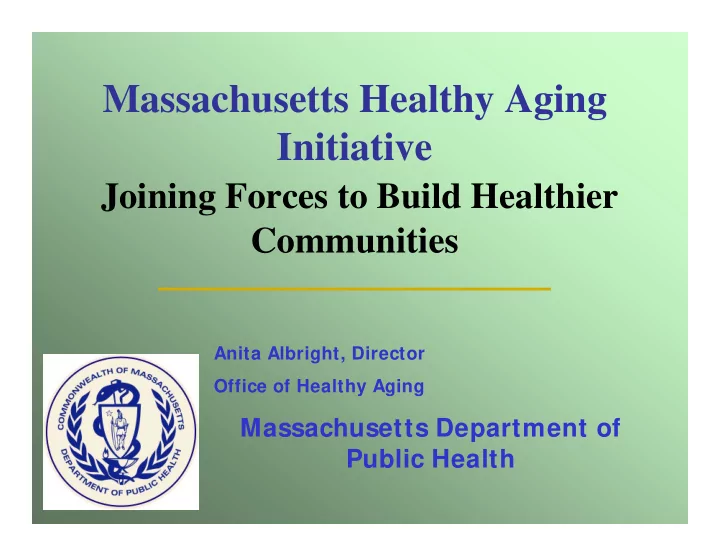

Massachusetts Healthy Aging Initiative Joining Forces to Build Healthier Communities Anita Albright, Director Office of Healthy Aging Massachusetts Department of Public Health
Chronic Disease in MA • While there are many chronic conditions that people in Massachusetts live with, these five place an overwhelming burden on our residents: – cancer – cardiovascular disease – diabetes – asthma – overweight/obesity
Leading Causes of Death by Race/Ethnicity, Persons Ages 55+ years Massachusetts: 2000-2006 White non-Hispanic Black non-Hispanic 1. Heart Disease 1. Cancer 2. Cancer 2. Heart Disease 3. Stroke 3. Stroke 4. CLRD 1 4. Diabetes 5. Influenza & Pneumonia 5. Nephritis Hispanic Asians non-Hispanics 1. Heart Disease 1. Cancer 2. Cancer 2. Heart Disease 3. Stroke 3. Stroke 4. Diabetes 4. Diabetes 5. CLRD 1 5. CLRD 1 1 Chronic Lower Respiratory Disease
Diabetes in Massachusetts • 11.5% of persons aged 55-64, • 18.2% of persons aged 65-74 and • 17.1% of persons aged 75 and over have diabetes (BRFSS 2008).
Heart Disease in MA • 4% of persons aged 55-64, • 9.8% of persons aged 65-74 and • 13.6% of persons aged 75 and over have had a heart attack (BRFSS 2008).
Obesity in MA (BMI > 30) Persons: 55-64 years = 25.2% 65-74 years = 24.5% 75 and over = 15.0% Being overweight is a risk factor for: • cardio vascular disease, • cancer, • asthma, and • diabetes
Modifiable Risk Factors for Chronic Disease � nutrition � activity patterns � Tobacco, alcohol, and drug use
Approaches to Health Behavior Change � Education � Awareness � Early Intervention
What’s wrong with that? • Knowledge alone does not alter behavior • Individual behavior is determined to a large extent by social environment
Self-Management Programs Behaviors are Modifiable. Knowledge + Self-efficacy = Behavior Change better disease control. better health status. reduced preventable ER & hospital stays. reduced care costs. RAND Health/AHRQ Publication No. 08-0011 Nov. 2007
MDPH Healthy Aging Unit and Executive Office of Elder Affairs Healthy Aging Strategic Planning MA Chronic Disease Self-Management White Paper
Stanford’s Chronic Disease Self-Management Program Massachusetts My Life, My Health • Evidenced-based • Comprehensive • Six weekly 2 ½ hour workshops • Topics & strategies are generic. – Bridges gaps in fragmented health care system.
My Life, My Health • Community setting enhances access, social & cost benefits. • Trained peer leaders & potential further cost containment with community health workers. • Welcomes caregivers as participants. • Complements & supplements disease-specific education, providing additional time for patients to master healthy living behaviors.
Skills Acquired • Management of • Nutrition symptoms • Exercise • Goal setting • Treatment techniques • Pharmaceutical use • Decision taking skills • Enhanced knowledge • Creation of mutual of chronic disease support systems
My Life, My Health Massachusetts Massachusetts Capacity May 2009 Capacity May 2009 • 6 T- -Trainers Trainers • 6 T • 76 Master Trainers • 76 Master Trainers • 101 Group Leaders 101 Group Leaders •
Sustainability for Chronic Disease Self-Management Program � State-wide infrastructure with policy cohesion & cooperative partnerships � Community networks: access & capacity � Funding: reimbursable benefit � On-going marketing & recruitment: multiple referral pathways � Monitoring & continuous quality improvement Challenges and Successes in Implementing the Chronic Disease Self- Management Program”, National Council On Aging, www.healthyagingprograms.org/resources/CDSMPFinalReport.pdf
MDPH and Elder Affairs since 2004 • Key Partners: Elder Services of the Merrimack Valley, Hebrew Senior Life & Action for Boston Community Development, MA Councils on Aging • Goal: Strengthen integration of CDSMP in aging services and public health network • US Administration on Aging Grant, National Council on Aging, CDC Arthritis Program, National Association of Chronic Disease Directors, and 27 other states with Empowering Older Adults grants
Public Health Goals for Chronic Condition Self-Management • Support ability of aging and public health systems to work with communities to empower people to better manage their chronic conditions & adopt healthier lifestyles. • Expand state-wide infrastructure for delivering My Life, My Health . • Establish My Life, My Health as reimbursable insurance benefit.
Socio-Ecological Framework
Why policy and systems change? • Supports at-risk individuals with one or more chronic conditions • Creates a supportive environment to enable people to lead healthy lives • Make healthy choices possible or easier • Make social and physical environments health enhancing • Provides building blocks for the sustainability of community-based health improvement
Recommend
More recommend